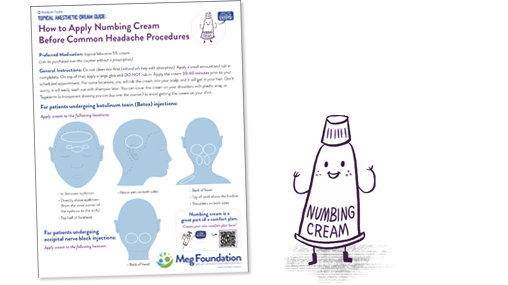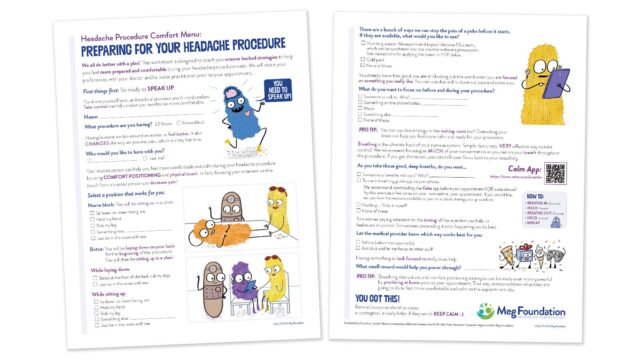
Headache Procedures Numbing Cream Guide
This easy-to-follow guide shows how to use numbing cream to reduce pain during headache treatment procedures like Botox and nerve blocks.
About this resource
Planning to use numbing cream before a needle procedure for headache treatment? This guide walks you through exactly how—and where—to apply topical lidocaine 5% (or other numbing cream) to help reduce discomfort during treatments like Botox or nerve block injections.
This quick-reference sheet provides step-by-step instructions and visuals to make the process simple, safe, and effective. Because when patients feel more prepared and comfortable, everything goes more smoothly.
Thanks to our friends at the UCSF Child & Adolescent Headache Program for their help in making this project.
How to use it
PARENTS, CAREGIVERS AND KIDS: Use this guide before procedures like Botox or occipital nerve blocks. It shows the correct areas to apply topical numbing cream depending on the procedure, how long to leave it on, and pro tips like using plastic wrap or Tegaderm to keep it in place.
Numbing cream can take 30-60 minutes for full effect, so applying cream at home is an effective way to make sure it’s working when you get to the doctor. It stays effective for quite some time, so you don’t need to worry about putting it on too early. Topical lidocaine 5% cream is available over the counter and can be a powerful part of your comfort plan. Just follow the steps, give it time to work, and walk into your appointment with confidence.
CAREGIVERS: Send this resource to patients/families before a nerve block or Botox appointment so they can come into their appointment prepared. When families apply numbing cream correctly at home, it helps with pain, anticipatory and procedural anxiety, and minimizing wait time at the clinic.
Who is it for?
This resource is for anyone—kids, teens, or adults—undergoing headache-related procedures who want to reduce pain and make the experience easier. It’s also for caregivers and clinicians who want to support patients in using this simple, science-backed strategy.
You May Also Be Interested

Resource
Headache Procedure Comfort Plan
This Headache Procedure Comfort Menu helps people of all ages feel more prepared and supported during treatments like Botox and nerve blocks. It offers simple, science-backed strategies to reduce stress and improve comfort.

Blog Post
Keep Calm and Carry On: A Pediatric Headache Specialist Shares Her Tips for Helping Kids Feel Better
As a pediatric headache specialist, I love teaching kids about headaches and partnering with them to improve their pain. Seeing kids get back to what they love (sports, music, hanging out with friends) is so rewarding! Let’s walk through some helpful information about headaches.